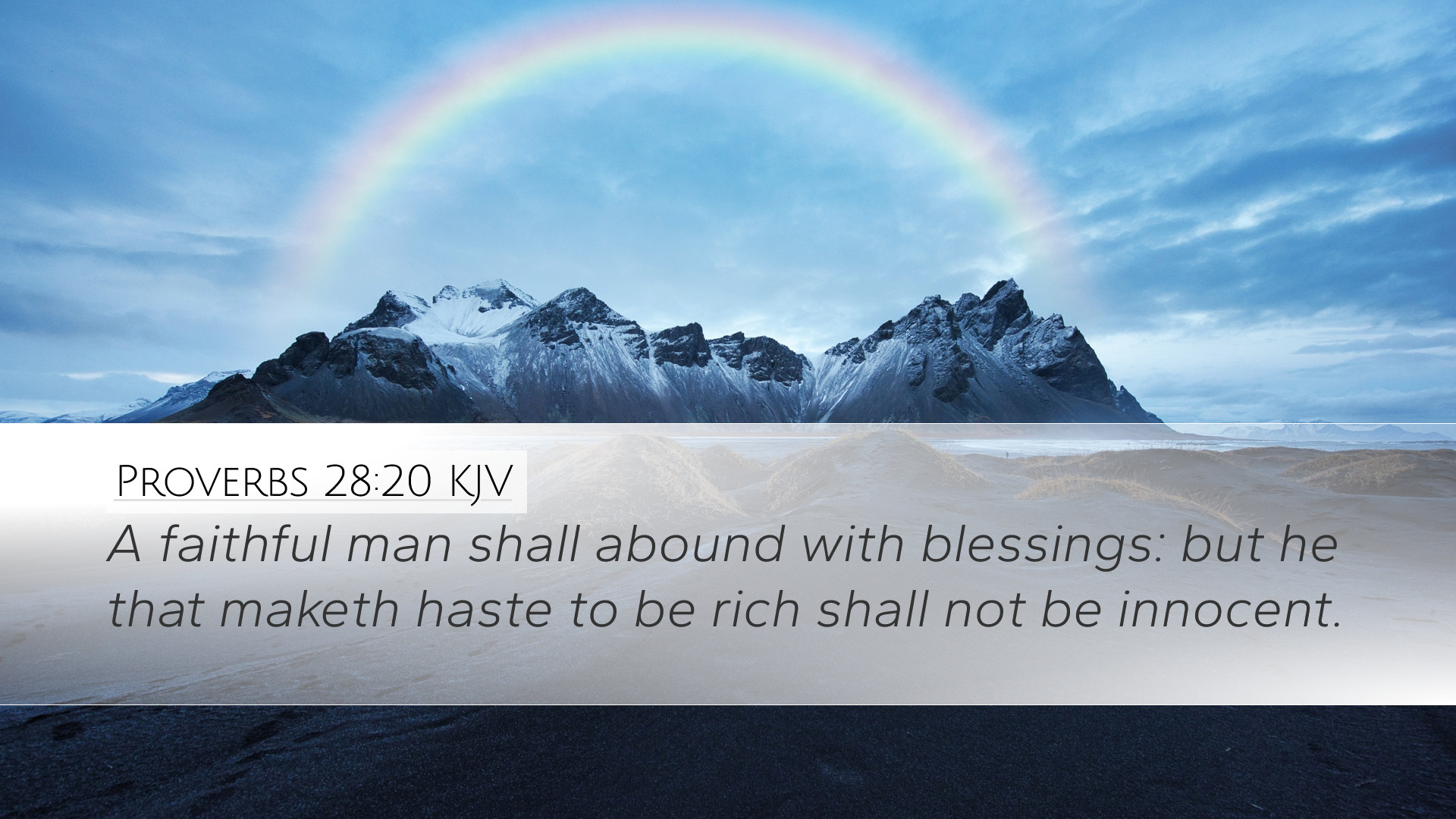Commentary on Proverbs 28:20
Proverbs 28:20 states, "A faithful man will abound with blessings, but whoever hastens to be rich will not go unpunished." This verse serves as an essential admonition concerning the virtues of faithfulness contrasted with the vices associated with greed and haste in seeking riches. Below is a detailed summary and commentary derived from various public domain sources, including insights from Matthew Henry, Albert Barnes, and Adam Clarke.
Contextual Background
The Book of Proverbs is a collection of wise sayings and teachings primarily attributed to King Solomon. It reflects on various aspects of life, emphasizing the importance of wisdom, righteousness, and moral living. Proverbs 28, in particular, addresses several themes, from justice and social order to personal integrity and wealth.
Exegesis of Proverbs 28:20
The Faithful Man
Matthew Henry emphasizes the characteristics of a faithful man, noting that faithfulness involves integrity, trustworthiness, and diligence in one's endeavors. A faithful individual can be expected to bring blessings not only upon themselves but also upon those around them due to their honorable conduct and reliance on God.
The Abundance of Blessings
Henry further explains that "abounding with blessings" refers to both spiritual and material abundance. The faithful are rewarded as their actions align with God’s will, leading to experiential blessings in their lives, family, and community.
Hastening to Be Rich
Albert Barnes provides insight into the phrase "whoever hastens to be rich," suggesting that this speaks to the mentality of covetousness, where one desires wealth at the expense of moral integrity. Barnes cautions that in the pursuit of wealth through unscrupulous means, individuals may find themselves ensnared by their own greed.
The Consequences of Greed
Additionally, Barnes notes that the verse concludes with a warning: "will not go unpunished." This implies that there are inherent dangers and moral repercussions tied to the pursuit of wealth that is sought unjustly. It reflects the biblical principle that one's choices have consequences, particularly when one prioritizes material gain over ethical conduct.
Theological Interpretations
Adam Clarke offers a theological perspective on this verse, interpreting it through the lens of divine providence. He stresses that God's providence rewards the faithful with blessings in due time while highlighting that the pursuit of wealth, especially when rushed, is not only foolish but can also lead to spiritual demise.
The Role of Patience
Clarke advocates for patience and trust in God’s timing, emphasizing that the faithful should wait for God’s provision rather than force their own way into riches. Waiting on God's blessings often cultivates deeper faith and character, contrasting sharply with the impulsiveness of those who seek quick wealth.
Applications for Life
- Integrity in Work: Churches and leaders should promote integrity in all endeavors, modeling their actions after the "faithful man" in the proverb. Pastors can encourage congregants to reflect on their work ethic and honesty in financial dealings.
- Discernment in Pursuits: The warning against greed draws attention to the necessity for discernment in one's pursuits. Leaders and theologians can stress the importance of aligning one's goals with godly principles rather than worldly desires.
- Patience and Trust: Encourage individuals to practice patience in their financial and personal ambitions, trusting in God’s timing and provision, as Clarke notes. This fosters a reliance on God rather than a frantic chase for riches.
- Community Impact: The faithful man’s blessings have a rippling effect on the community. Churches should focus on how faithfulness in individual lives brings collective blessings, encouraging communal support and accountability.
Wrap Up
In conclusion, Proverbs 28:20 serves as a timeless reminder of the virtues of faithfulness and the perils of greed. By understanding and applying the insights from Matthew Henry, Albert Barnes, and Adam Clarke, pastors, students, and scholars can enhance their comprehension of this scripture. It encourages believers to embody faithfulness in their lives while remaining wary of the fleeting allure of riches.


